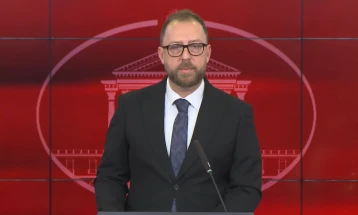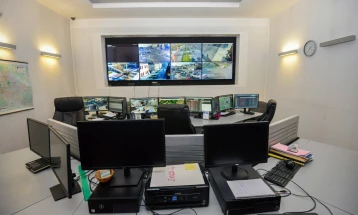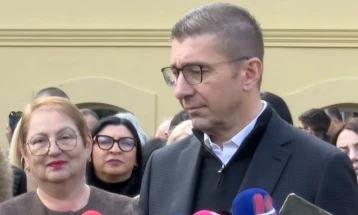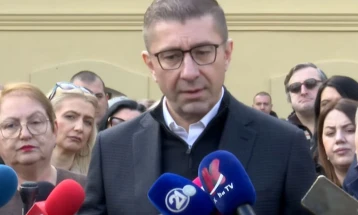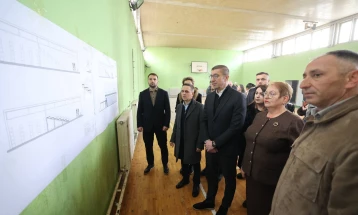EC: North Macedonia is in between some and moderate level of preparation on freedom of expression
- North Macedonia is in between some and moderate level of preparation on freedom of expression. Overall, it made limited progress. The general context is favourable to media freedom and allows for critical media reporting. The amended Criminal Code and Law on civil liability for defamation raised the overall level legal protection for journalists. However, a number of attacks, threats and some intimidating behaviour towards journalists were noted, the European Commission assesses in the latest Progress Report on North Macedonia.
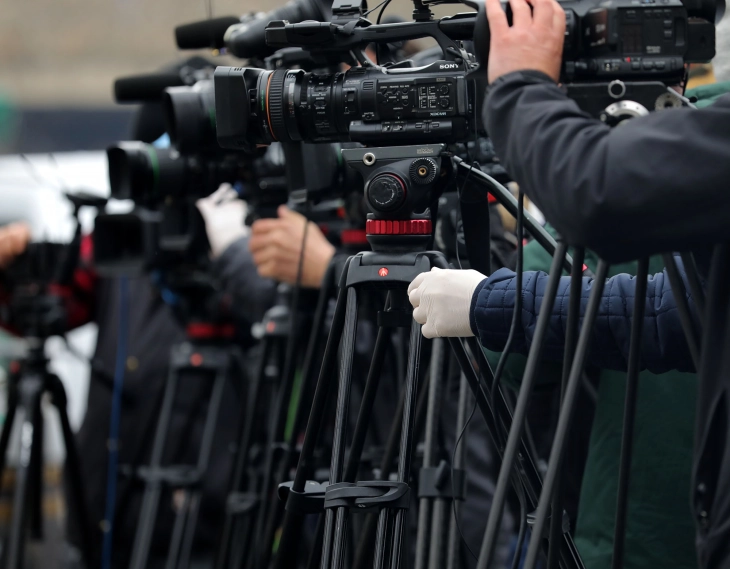
Skopje, 9 November 2023 (MIA) - North Macedonia is in between some and moderate level of preparation on freedom of expression. Overall, it made limited progress. The general context is favourable to media freedom and allows for critical media reporting. The amended Criminal Code and Law on civil liability for defamation raised the overall level legal protection for journalists. However, a number of attacks, threats and some intimidating behaviour towards journalists were noted, the European Commission assesses in the latest Progress Report on North Macedonia.
Greater transparency is needed regarding media advertising by state institutions and political parties. Reform of the public service broadcaster is required to strengthen its independence, professional standards and financial sustainability. Since December 2018, Parliament has been delaying the appointment of the public service broadcaster’s programming council and media regulator’s council. Working conditions for journalists remain challenging, according to the EC Progress Report.
The Commission’s recommendations from last year remain valid. In the coming year, North Macedonia should revise the legal framework governing the media to bring it into line with the EU acquis and European standards, in particular on competition and state aid rules, intellectual property rights, part of the EU Single Market; step up implementation of the strategy to reform the public broadcaster and finalise appointments for the public service broadcaster’s programme council and the media regulator’s council; continue to promptly address all threats and acts of violence against journalists and ensure perpetrators are brought to justice.
“The overall environment enables freedom of expression and critical reporting. The legal framework was strengthened: the amended Criminal Code and the Law on civil liability for defamation, adopted in November 2022, have increased legal protection for journalists. Systemic challenges remain to be addressed: deep media polarisation, physical and verbal violence against journalists, working conditions for media workers, especially their labour and social rights. The laws encompassing the functioning of the media need to be implemented. Digital technologies and disruptions on the media market point to the need for a general strategy on reform of media in cooperation with all stakeholders,” the EC added.

Intimidation of journalists
In the part to intimidation of journalists, the EC assessed that in 2022, the Ministry of the Interior recorded 17 cases of attacks against journalists and opened investigations. The Association of Journalists recorded 14 incidents involving journalists, of which 4 involved physical attacks or illegal detention, and 11 involved verbal attacks, threats and other forms of intimidation. The Agency for Audio and Audiovisual Media Services and the media associations regularly condemned such incidents, it added.
In February 2023, Parliament adopted amendments to the Criminal Code increasing protection for journalists while performing their professional duties. The Public Prosecution Office in Skopje appointed of a prosecutor to monitor the proceedings in response to attacks on journalists, the Report noted.
“This is a positive development. The public prosecutor appointed has the authority to monitor proceedings in which journalists appear as injured parties, witnesses or reported persons while performing their work. The Ministry of the Interior appointed a contact person at the Department of Cybercrime and Digital Forensics making it easier for journalists to report incidents involving cyberbullying and other online threats to their safety. The authorities need to ensure impartial, speedy and effective investigations in bringing perpetrators to justice. Politicians and public officials on different occasions used unacceptable language against journalists. Online harassment and verbal attacks continued, especially on social media, with an increase in cases against female journalists. Old cases of physical attacks against journalists remain unresolved.
Legislative environment
The EC noted that the Law on audio and audiovisual media services is broadly in line with the EU acquis, following the legislative changes of July 2023. Furthermore, the legal framework encompassing the functioning of the media needs to further improve, in line with EU acquis and international standards. The OSCE ODIHR recommendations on the electoral legal framework have still to be addressed. The concerns raised by media associations about statefunded political advertising in the media need to be addressed in line with the EU acquis and European best practices.
In November 2022, a group of parliamentarians proposed amendments to the Law on audio and audio-visual media services that impose, on the government and local authorities, duties to organise and fund public interest campaigns. However, the media regulator and some associations of journalists criticised the proposals, stressing that they could undermine the independence of the media and disrupt the media market. More sustainable solutions are needed to support media viability, it said.
In 2022, the government continued to reduce funding for the broadcasting sector. Parliament, once more, failed to appoint new members to the Public Service Broadcaster’s Programme Council and Media Regulator’s Council. The terms of office of the current members of both councils was extended until Parliament elects new members.

Implementation of legislation/institutions
In 2022, the media regulator continued its supervisory role over various forms of media and over illicit media concentration and ownership. The regulator continued to work with CSOs and media outlets to promote media literacy and human rights topics such as gender equality and respect for the rights of persons with disabilities by broadcasters.
The financial stability and independence of the media regulator need to be strengthened. This is even more important since it received additional responsibilities following the alignment of the national legislation with the EU Audiovisual Media Services Directive, the Report read.
In 2022, the Council of Media Ethics received 78 complaints about breaches of ethical standards. The most frequent complaint, accounting for 49.37% of cases, was about violations of the legal provision that ‘the journalist should publish accurate and verified information’. Though hate speech is prohibited online and offline, it persists online. In 2022, the association of journalists expressed particular concern about hate speech and insults directed at journalists and media workers by politicians and other public office holders. The number of defamation and insult lawsuits involving journalists was more than double the number for last year: 54 cases in 2022 against 20 in 2021.
Public service broadcaster
Reform of the public service broadcaster was further delayed. Despite the 2021 Law on audio and audiovisual media services, in 2022, the authorities once again used discretionary powers granted by law to cut funding to the broadcasting sector. Budgetary fluctuations create uncertainty in planning. The authorities need to provide sufficient and stable funding for the public broadcaster. No solution was found to settle the public service broadcaster’s old debts towards state institutions. Further efforts are needed to ensure the independence and sustainability of the public broadcaster, both financially and legally, the Report added.

Economic factors
The COVID-19 pandemic, Russia’s war of aggression against Ukraine and the global economic and energy crises created additional pressures on the media industry. The authorities supported media outlets through a range of economic measures, including a reduction in the broadcasting licence fee for radio and television for 2023.
Media associations continued to raise concerns about media integrity and editorial independence, and indicated the need for an assessment of the impact of ownership concentration on media pluralism and editorial independence. They also pointed to the risk of individuals or a group of media owners having excessive influence on media outlets. Further support is needed for the development of professional and investigative journalism. Media independence should be further safeguarded.
In November 2022, a group of MPs submitted amendments to the Law on audio and audiovisual media services to lift the ban on government advertising on commercial channels.
Some media associations oppose this, fearing it could undermine the independence of the media and disrupt the media market. Media associations continued to express concern over legal provisions enabling political parties to use state funding to advertise in the media and over the lack of transparency of party-political advertising generally and on online media 32 platforms in particular. In 2022, there were five daily newspapers, including two in Albanian. The authorities continued to support the print media with just over EUR 300 000 in funding.
As required by law, the media regulator publishes a register of broadcasting and print media, including information on the number of employees and type of employment. The number of online media outlets is estimated at between 150 and 200, it noted.

Internet
Online media are not governed by any specific law. There is a shift in the advertising market towards digital, with growing threats from disinformation, breaches of intellectual rights, and a lack of transparency concerning paid political advertising. Certain online media outlets are subject to influence from political figures. Political parties are not obliged to disclose their spending on social media campaigns. There is inadequate oversight regarding the utilisation
of personal data for election campaign purposes.
The public’s understanding of the risks of disinformation needs to be improved as do and media literacy skills throughout society. Current counter-disinformation measures are not very effective.
Stronger self-regulation is needed for online media, in particular through promotion of the registry of online media (promedia.mk) and the development of professional standards for online journalism. With regard to access to information, the Agency for the Protection of Free Access to Public Information received 343 complaints, of which 195 were predominantly from CSOs, while 148 complaints were filed by individuals.
Professional organisations and working conditions
According to the Report, in 2022, the Independent Trade Union of Journalists and Media Workers registered various breaches of labour rights, notably the high number of short-term or part-time contracts with no health and social insurance, no right to annual leave, unpaid overtime and compulsory night shifts.
Dialogue with the government needs to be improved. Advocacy aimed at improving working conditions in the media is hindered by economic challenges in the sector and opposition to the unionising of journalists. Further efforts are needed to protect journalists’ professional and labour rights, freedoms and security, in particular by strengthening the legal framework for the work of unions. Many journalists have no choice but to accept precarious contractual arrangements. This, together with difficult socioeconomic conditions in the sector, contribute to a culture of self-censorship and create opportunities for media owners to influence editorial policy.
The Agency for Audio and Audio-visual Media Services launched a new specialised website on gender equality and media, aiming to serve as a resource centre for journalists. Analysis showed that there are too few women executives in the private media. Additional measures to promote gender equality in the media industry are needed, the Report noted.
Photo: MIA archive

